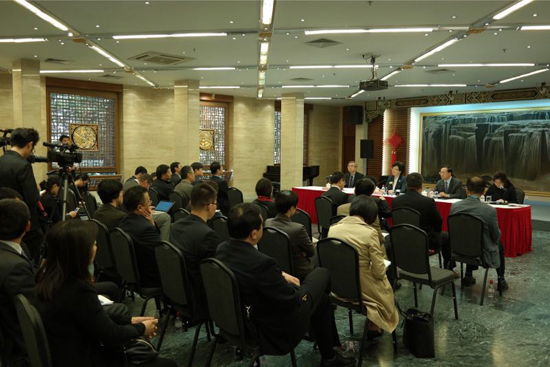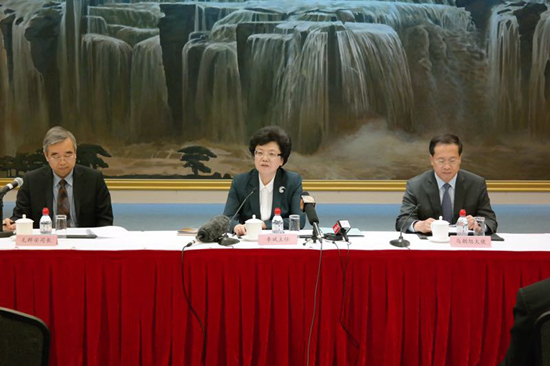Regular news conference held by China Delegation to 70th World Health Assembly
At 4:00 pm May 21 (Geneva time), China’s delegation to the 70th World Health Assembly held a news conference in Geneva, Switzerland.

Regular news conference is held by China Delegation to 70th World Health Assembly on May 21.
In response to questions raised by ItarTass News Agency, Phoenix TV and the Associated Press, Dr Li Bin, Head of the China delegation and Minister of the National Health and Family Planning Commission (NHFPC) of China, commented on Taiwan-related questions of this year’s World Health Assembly. She said that the participation of Taiwan in the activities of international organizations must be dealt with in accordance with the one-China policy.

Minister Li Bin responds to Taiwan-related questions of the World Health Assembly.
Taiwan compatriots are our brothers and sisters by bond of blood. The attitude of the central government of China in addressing the health issues of interest to Taiwan compatriots is sincere and earnest, and the active measures taken are practical and effective.
If the Taiwan authorities under the ruling Democratic Progressive Party truly care about the health and well-being of Taiwan compatriots, they should return to the one-China policy and the 1992 Consensus, which are the only right tracks that can truly benefit the people.
She also said that the World Health Organization (WHO) is a specialized agency of the United Nations. United Nations General Assembly Resolution 2758 and World Health Assembly Resolution 25.1 provide the legal basis for the WHO to follow the one-China policy.
It is a matter of course and highly appropriate for the WHO to implement those resolutions. From 2009 to 2016, the central government of China agreed to let Taiwan attend the World Health Assembly as an observer in the name of "Chinese Taipei" for eight consecutive years, which was a special arrangement made on the premise of the one-China principle after consensus had been reached through cross-Straits consultations. After the Democratic Progressive Party came into power in Taiwan, it refused to recognize that the two sides of the Taiwan Straits belong to one China. By so doing, it undermined the political basis of the cross-Straits relations, and brought the cross-Straits contact and communication mechanism to a standstill. As a result, the political basis of the Taiwan region's participation in the World Health Assembly has ceased to exist and it is impossible to carry out any further cross-Straits consultations based on the special arrangement.
In other words, it is the Democratic Progressive Party itself that has set the barrier to the participation of the Taiwan region in the World Health Assembly.Only when the political basis that reflects the one-China principle is reaffirmed can regular cross-Straits contacts be continued and cross-Straits consultations regarding the attendance of the Taiwan region at the World Health Assembly be conducted.
She pointed out that the central government of China has always attached great importance to the health and well-being of Taiwan compatriots and has taken a lot of measures to promote cross-Straits exchanges and cooperation in the health sector. On the premise of the one-China policy and the 1992 Consensus, the Association for Relations Across the Taiwan Straits (ARATS) of the Chinese mainland and the Straits Exchange Foundation (SEF) of the Taiwan region of China have signed agreements such as the Cross-Straits Cooperation Agreement on Health, the Food Safety Agreement, and the Framework Agreement on Cross-Straits Economic Cooperation, which have established multiple platforms for exchanges and cooperation such as prevention and treatment of communicable diseases, drug safety management, drug research and development, traditional Chinese medicine (TCM) research and development and TCM exchanges. Cooperation mechanisms have also been established, such as those on two-way emergency medical rescue, public health emergencies and traditional medicine. Medical institutions, social groups and young physicians (medical students) across the Taiwan Straits are also exchanging and cooperating with increasing frequency.
She stressed that on the premise of the one-China principle, China has made proper arrangements for the Taiwan region to participate in global health affairs. Medical and public health experts of the Taiwan region can attend technical activities of the WHO. When necessary, the WHO can also send staff and technical experts to the Taiwan region for study of health and epidemics. Through consultations with the WHO, China has also made proper arrangements for the application of the International Health Regulations (IHR) (2005) in the Taiwan region. Within the framework of those arrangements, an IHR contact point has been set up in the Taiwan region able to access information on public health emergencies released by the WHO. The so-called epidemic prevention gap simply doesn’t exist.
- NHC minister visits Cuba
- NHC vice-minister meets with president of GE HealthCare
- NHC minister holds talks with WHO director-general via video link
- NHC minister meets with German health minister
- China to allow wholly foreign-owned hospitals in certain areas
- China's average life expectancy rises to 78.6 yrs


